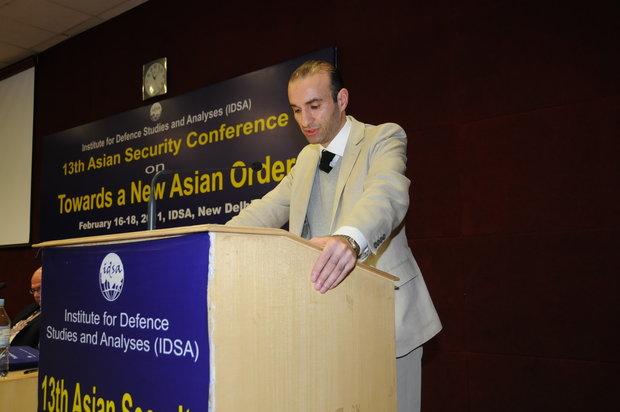ID :
494973
Mon, 06/11/2018 - 13:37
Auther :
Shortlink :
https://oananews.org//node/494973
The shortlink copeid
Prof. Adib-Moghaddam: AI could be single greatest danger to human security

TEHRAN, Jun. 11 (MNA) – Professor Arshin Adib-Moghaddam, Chair of the Centre for Iranian Studies at the London Middle East Institute believes that Artificial Intelligence could be the single greatest danger to human security, if it is not interrogated and supervised by civil society.
In an interview with Mehr News Agency, Professor Arshin Adib-Moghaddam, Chair of the Centre for Iranian Studies at the London Middle East Institute, adds that “intellectuals have a duty to assess, and if necessary to resist, the militarisation of Artificial Intelligence and the robotization of warfare.”
He adds that “the first technology that made the sudden end of humanity possible was the atomic bomb – the second is Artificial Intelligence.”
Here is the full text of the interview:
Tell us about your forthcoming book. What is your main question in that book, and what hypothesis have you used to answer that question?
I am currently working on two projects at the same time. The first one will be my last study about Iran for now. It will give an analytical account about how to understand, study and explain contemporary Iranian domestic politics and international affairs. To that end, it employs what I call a discursive-musicological approach. Each chapter is introduced by a musical piece in order to introduce the reader to the theme of the section of the book. For instance, I have chosen Thus spoke Zarathustra by Richard Strauss for the introduction, in order to represent the momentous and ancient presence of the topic of Persia in global history. This anthem by Strauss was also used in the movie Space Odyssey by Stanley Kubrick and as a prelude to the concerts of Elvis Presley in the 1970s. For the chapter about the revolution of 1979 I have chosen the anthem by Reza Rooygari (Allah Allah), because it indicates to me in a very powerful way the explosive force of the Iranian movement, and the utopian yearnings of that generation. As indicated, this will be my last book about Iran for a long time, perhaps forever.
I have recently extended my research focus in the direction of Artificial Intelligence and its impact on humanity. In my opinion, and I share this view with the late Stephen Hawking, AI could be the single greatest danger to human security, if it is not interrogated and supervised by civil society. Google only recently declined a Pentagon contract that would have added to existing forms of robotic warfare. This is a scary world that we are manoeuvring to. Intellectuals have a duty to assess, and if necessary to resist, the militarisation of AI and the robotization of warfare. In my own research, I see AI as the natural outcome of the scientific determinism embedded in western Enlightenment thought which was always also pregnant with dangers for humanity. The first technology that made the sudden end of humanity possible was the atomic bomb – the second is AI. So I intend to move most of my intellectual resources in this direction now.
What is the necessity of writing this book?
I don’t write my books out of necessity. I write them in order to filter my ideas, understand the subject and to share my conclusions with my readers. Having said that, there is a normative ambition. In my work about Iran, I have tried to battle against misperceptions about what the country is and what the country is not. As you know: There is a lot of nonsense that has been written about Iran. As a Persian proverb says: Everyone who broke off with their mother is writing about Iran. There is a market out there which demands “Iran experts.” The problem is that many of them are uneducated about the country or they follow an ideological agenda. So university scholarship, as in Europe it is mostly free from politics, remains the main driving force for a truer knowledge about the “other”. In today’s world is it a great luxury to think and to write with relative freedom. In Europe, in the UK it is still possible to do so and many of us within academia have tried to stem the tide of anti-Iranian agitation beyond the university. I feel that I have contributed enough to that endeavour. It is time to let this research rest.
I am not entering a second phase in my interests and research priorities which is why I have started to focus on Artificial Intelligence. I find the topic intellectually challenging, fascinating and slightly discomforting. For the trends for a new form of warfare which may threaten our security in a way that we can’t even fathom at this stage, are already apparent. We shouldn’t forget that Oppenheimer started out as a scientist of theoretical astronomy. Initially, nuclear physics was meant to bring about better energy not the Manhattan Project and the atomic bomb. The research into AI, already facilitated and sponsored by the military-industrial complex in a range of countries, is by far more brazen. Within a decade AI will be part of our daily lives and a major factor of the wars all over the world. We are entering a post-human phase of global history. I am very interested in the consequences.
Interview by: Javad Heirannia





